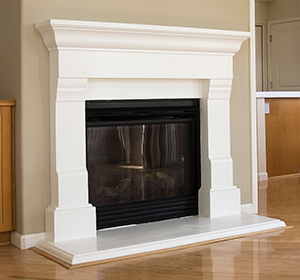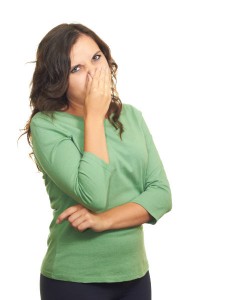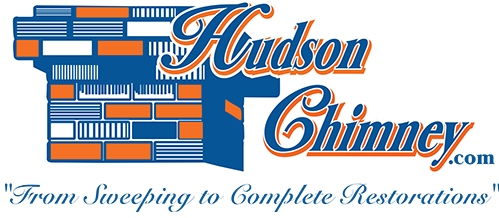by Mark Hudson | Jan 29, 2020 | Fireplace Maintenance
No matter what type of chimney and fireplace system you have and no matter how often it is used, it still requires annual maintenance to maintain safety for your family and long-lasting parts and functionality. To get straight to the point, the fireplaces and chimney systems which are cleaned regularly and inspected annually are the ones that are most safe and efficient year after year—both the Chimney Safety Institute of America (CSIA) and the National Fire Protection Association (NFPA) say so (and we agree).
and chimney systems which are cleaned regularly and inspected annually are the ones that are most safe and efficient year after year—both the Chimney Safety Institute of America (CSIA) and the National Fire Protection Association (NFPA) say so (and we agree).
Unsafe Chimneys Put Lives at Risk
When you neglect your annual maintenance, your chimney will suffer, which means your fire will suffer, and your comfort and safety will as well. As your fire burns, chemical byproducts are released into the flue system where they vent safely outside the home. When this process is interrupted, the smoke and toxins can push into the rest of the house, affecting the breathable air and putting your family at risk for carbon monoxide exposure and particulate pollution.
Additionally, when the fire doesn’t vent properly it will be difficult-to-light and will require more fuel to reach the desired temperature. This heat will not go up the chimney the way it’s intended and designed, so the risk for accidental fire goes up. A flue fire can be catastrophic, destroying your property and causing injury or even death to family and guests.
It’s our goal and the goal of every CSIA certified chimney professional to bring down the occurrence of residential chimney fires and chimney-related incidents. We help our friends and neighbors in and around Jacksonville, Florida maintain safety and comfort for their homes by offering expert chimney services.
Signs Your Chimney Needs Maintenance
Your chimney system is put to work every time you light a fire and it requires annual maintenance no matter how often it’s used. If you haven’t scheduled a chimney sweep or inspection for your system in the last 12 months, now is the time. Though your chimney system needs basic services annually, there are certain signs that indicate the system needs attention right away.
- Odors in the fireplace and chimney: Odors mean a problem in the system. Depending on the odor, the problems may be extreme and dangerous. A barbecue smell means the system is dirty and likely has obstructions and flammable creosote deposits. A mildew odor means there is a chimney leak and is likely causing water damage. Foul odors of decomposition mean the system is dirty with decomposing organic materials like leaves and limbs—even a possible dead animal! Any odors in the system mean an expert eye needs to assess the system.
- Spalling masonry: Broken, cracked, and crumbling masonry is a serious problem that can allow water into the system, can lead to structural issues, and can compromise ventilation. If your masonry is damaged, it’s important to call a professional who can assess and repair it properly, and prevent a recurrence.
- Chimney leaks: A chimney leak may not only occur inside the chimney system itself. While the water may enter by way of the chimney, the leak can occur anywhere in the home as water runs through flooring and walls and can form a leak several rooms away from the chimney. If you have a leak anywhere in your home, or notice dripping sounds or visible signs of a leak in the chimney itself, it’s time to call a professional.
- A smoky fireplace: If your fireplace is smoky, the flue isn’t venting properly. It may be that your flue is obstructed, dirty, or your damper isn’t working properly. Your smoky fireplace may even be caused by the wrong type of firewood. In order to determine the source of your smoky fireplace, call a professional who can complete a basic assessment before you use your fireplace and expose your family to smoke inhalation.
- Stains on the chimney or in the fireplace: Stains on the inside of the firebox (or fireplace) can be a sign of the wrong firewood, a ventilation problem, or a leak. This needs to be addressed by a certified professional. Additionally, exterior stains are a problem. Red/brown stains at the top of your chimney is a sign of a damaged or dislodged cap. White stains on the masonry surface mean water is passing through the masonry and leaving minerals on the surface.
No matter what type of damage you have discovered or signs you’ve noticed, it is never too late to have it repaired, and it’s never too early to call an expert. At Hudson Chimney we are trained to diagnose and make repairs of the smallest kind so that our customers can avoid costs of the big kind.
When it’s time to schedule your services, schedule with us. Call Hudson Chimney at 904-282-4159 and put your trust in the CSIA Certified Chimney Sweeps that have been serving Jacksonville, Florida for over 30 years.
by Mark Hudson | Jun 27, 2014 | chimney maintenance, fireplaces

Can’t bear that unpleasant odor coming from your fireplace? It’s time for an inspection and thorough cleaning. Schedule an appointment today.
If your home has the strong, musty, smoky smell of an old cabin in the woods—but that’s not exactly the effect you were going for—and the origin of the smell seems to be your chimney and/or fireplace or stove, there is hope.
Being the owner of a well-loved and often-used fireplace does not mean you have to live with that overpowering fireplace odor. A trained chimney sweep will be able to suss out the cause of the smell and plot an effective plan for removal.
Why Does My Fireplace Smell?
Even though odors don’t usually vary much from fireplace to fireplace—hence most people know exactly what we mean when we say “that campfire smell”—this smell can actually be caused by a number of factors. The important thing to focus on isn’t why your chimney smells smoky; it smells smoky because it has likely accumulated soot and creosote from the fires you burn. Instead, you should focus on why this smoky odor is being dragged into your house. Ordinarily there is a problem with proper venting or with air pressure—both issues that can easily be addressed.
If you live in or around the Jacksonville, Florida, area—where we have worked for more than 30 years—one of Hudson Chimney’s certified chimney technicians will be able to determine the origin of your chimney’s odor. In the meantime, here are a few possible culprits:
- Dead animals or animal infestations are in your chimney; once the animals are removed, this problem can be easily remedied by adding a chimney cap or top-sealing damper to prevent animals from entering in the future.
- A clothes dryer, bathroom vent fan, or another appliance is exhausting air outside your home, and as a result negative air pressure is drawing outside air into your home through your chimney.
- If you have two or more chimneys, they may be competing for air pressure. This is known as “smoke crossover,” and occurs when a fire is exhausting from one chimney, causing the other chimney to draw in air and drag smoke in along with it.
How Do I Deodorize My Chimney?
If it’s been a long while since your chimney was professionally inspected and cleaned, those of us at Hudson Chimney will probably recommend that you start there. It’s kind of like having a physical if you haven’t been to the doctor in a long while. A thorough chimney and fireplace cleaning and sweeping will see to it that excess creosote and combustion byproducts—all of which are strong-smelling—are removed along with any animal nests or blockages.
If there is a backdrafting issue, no thanks to the recent addition of a range hood or energy efficient-windows, for example, your chimney technician will be able to recommend ways to allow your house to “breathe.” Beyond that, there are many proven methods for deodorizing and preventing chimney odors.
Have questions about chimney odors? Call Hudson Chimney today.
by Mark Hudson | Dec 23, 2013 | chimney maintenance, fire safety, fireplaces
Say Goodbye to Your Chimney Blockages
Is your home’s safety one of your top priorities? Do you want to save yourself from spending thousands of unnecessary dollars on expensive repairs from damages you could have prevented? Well, we’ve got the answers that you’re looking for!
Since it’s the Holiday season, you are busy preparing your house for the coming festivities. This is also most likely the only time of the year when you get to check how your chimney is doing. Most of the problems of homeowners have something to do with chimney blockages. Here at Hudson Chimney the safety and well-being of our clients always come first, we want to give you a few trade secrets on identifying the culprits of these very common chimney blockages.

Has your fireplace started pouring smoke into your living room? You may have a blockage.
Creosote
You have probably heard this being mentioned in TV commercials and promotional ads. Creosote is basically the Diva and superstar amongst all the common chimney blockers. If you don’t know what it is, it’s a particular by-product of burning wood on your chimneys. It builds up on the sides of your flue system. If left unnoticed, Creosote may accumulate and this can definitely lead to flue (or house) fires. It is highly flammable.
Debris
Things such as trash, tree foliage, leaves and other debris both natural and otherwise are also one of the most common causes of blockage. You would be surprised what we find stuck on people’s chimneys during regular inspections. Most homeowners are barely aware of what gets stuck up their chimneys. But without a chimney cap, the wind can deposit lots of debris into your chimney.
Animals
Small birds, raccoons, squirrels and animals and bugs are also one of the famous chimney blockers out there. Not only do they cause problems due to that blockage, but most of these animals (those unable to get out) create a nasty and putrid smell that can enter and spread to your homes.
What we can advise everyone to do to save more money and prevent further damage from happening is to get your chimneys inspected and swept often. You can also opt to get a chase cover or a chimney cap. Hudson Chimney is well updated with the technology that would ensure your safety and would help you from spending too much. So don’t wait until your chimney gets clogged, give us a call now and we’ll gladly help you out!
 and chimney systems which are cleaned regularly and inspected annually are the ones that are most safe and efficient year after year—both the Chimney Safety Institute of America (CSIA) and the National Fire Protection Association (NFPA) say so (and we agree).
and chimney systems which are cleaned regularly and inspected annually are the ones that are most safe and efficient year after year—both the Chimney Safety Institute of America (CSIA) and the National Fire Protection Association (NFPA) say so (and we agree).

